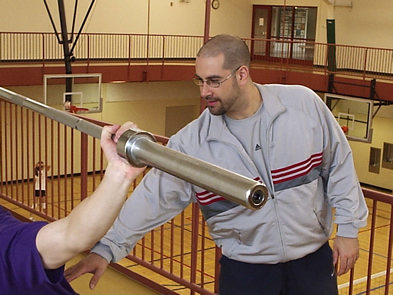Motivating When Training Young Athletes
By Melissa Lambert
As coaches you can all think of a time when a parent or young athlete has approached you demanding they start and play the entire game. Whether they deserve that level of recognition or not, in their eyes they will be a professional athlete some day and the expectation is that you cater to their needs. One of the most difficult aspects of coaching can be motivating young athletes to compete at peak performance not only as individuals but as a team. Conversely, when you have young athletes who feel entitled and need to be in the limelight all the time, you can expect a bigger challenge. An entitled child or athlete feels like he or she should receive without giving and working. This child often refuses to hear the word no and will lash out. Other signs of entitlement include not taking turns, impatience, putting themselves first, lack of compassion, tantrums and minimal manners.
These childhood or adolescent behaviors are not innate; they have been shaped by their environment. They are a result of over-parenting and giving children too much without earning it. Coaches can only foster the environment during the time in which they are working with the athletes, however they still play a critical role in overall physical and emotional development. The problem with giving children everything they want is building false expectations that needs and desires will be at the center of future relationships whether it would be with friends, coaches, teachers or a significant other. If you put into the perspective of a high school athlete, how might he or she handle getting beat out of a position by their own teammate? The entitled athlete will come up with a million excuses for why they deserve to be playing and will quit the team instead of fighting for that position back.
The number of children with high skill and low motivation I see when training young athletes is increasing and the philosophy of coaching our current generation of youth needs to change in developing future elite athletes.
Coaches need to be mindful not to set-up athletes to fail by giving them the preconceived notion they will become the next all-star young athlete in order to meet their desired outcome.
What you need to know to about coaching and training young athletes:
Over-coaching hurts a child’s confidence and underestimates an athlete’s ability.
It’s a similar concept to over-parenting when your role is to provide the necessities without over indulging. Athletes need opportunities to learn for themselves and make their own mistakes. It is easy to find yourself catering to a child who always seems to have a problem whether it’s pain, hunger or needing a water break every 10 minutes. Make sure you set firm expectations and limits from the beginning and make team values a precedence. If an athlete shows up late to practice they should know ahead of time what the consequence is. You should also encourage your athletes to problem-solve their own questions or challenges rather than doing it for them. This allows for autonomy and exploration. Trust that your athletes can handle a difficult situation independently or as a team while providing guidance when needed.
Focus on the resilience of an athlete – their ability to cope with stress and adversity.
It’s much easier to say no to an athlete with a mind set that he or she will become a stronger individual in the long run. I am sure we can all think of an athlete that cracks under pressure or loses composure at the thought of failure. A child or athlete who is entitled tends to lack resiliency, which frequently results in poor performance in challenging situations. Create opportunities through competition and teach the importance of responsibility in growth. In order to affect change when training young athletes, an athlete needs to take ownership and acknowledge a change needs to be made. The more athletes are put in difficult situations during practice, scrimmages, etc. the greater their ability to handle adversity in a game situation. Use narcissism, giving-up and low motivation as teaching tools during practice to break out of habits while positively reinforcing appropriate behaviors through praise or additional playing time.
Don’t reward or compliment children for unfitting attributes.
Studies indicate that children who are complimented for everything don’t benefit from being positively reinforced by praise. You build false hope in an athlete if you tell them they are doing well at something when they are not. This will result in a greater sense of disappointment later in life when reality sets in. Coaches need to teach young athletes that mistakes are necessary to become better and use weaknesses as coaching opportunities for improvement. Don’t make athletes feel like they need to be exceptional all the time by using unsubstantiated appraisals.
Coaches are not only an intricate part of athletic development but also help build a foundation for everyday life skills. It is crucial to allow for autonomy and avoid doing everything for your young athletes. They need to be able to handle adversity and effectively cope when challenges arise. Most importantly when training young athletes, encourage them to build off weaknesses instead of giving false hop resulting in future disappointment.
Melissa Lambert, M.Ed, LPC, YFS1, HSSCC, YNS
Child and Adolescent Therapist
Program Director – Connecticut Coast Soccer Performance Training Clinic




